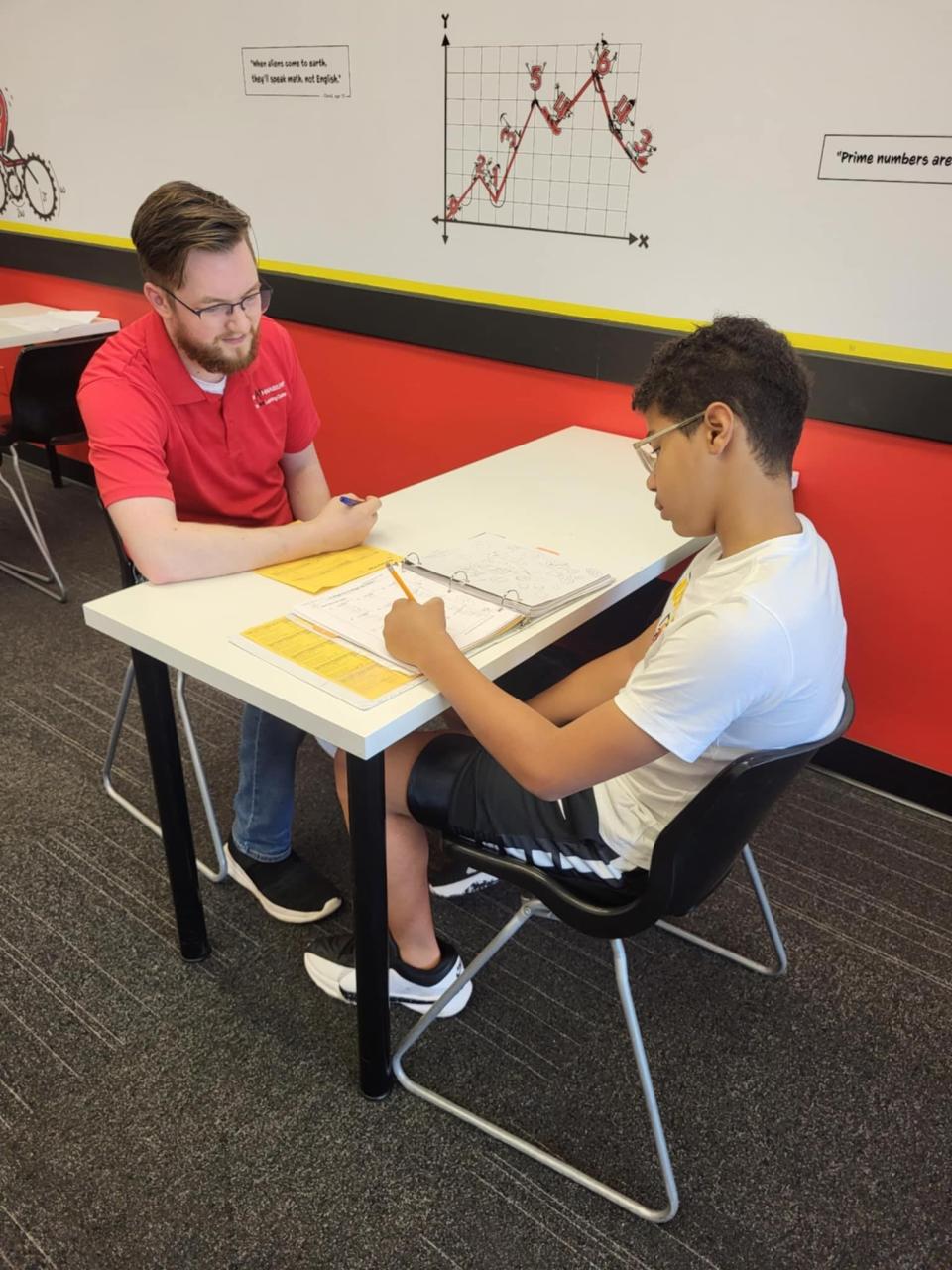'Not worth it': Parents struggle to get state money to help kids' education after pandemic

When the pandemic hit and threw a wrench into Ohio kids' education, the state launched a savings account program to reimburse parents for after-school activities − up to $500 at first and then up to $1,000 a year per qualifying child.
For many families, that's a huge help. That's a summer camp, or a few months of math tutoring, or maybe some music lessons. Thousands of Ohio families applied, more than 123,000 kids between the ages of 6 and 18 qualified, and the Ohio General Assembly appropriated $125 million to the Afterschool Child Enrichment program, or ACE.
But tens of millions of dollars still sit unused because the firm hired to run the program hasn't released the money to thousands of families for their children's activities.
Sam Laichas' 7-year-old daughter was one of those kids. But when Laichas filed a claim to get reimbursed for her daughter's after-school program, Champions, she was declined the funds the state had promised her.
She reworked her form and applied again. And again. And again. She was rejected every time.
"I got rejected seven times," Laichas said.
Laichas isn't alone. The state recently extended the deadline to use these funds until fall 2025 because families have spent less than one-third of the government-allocated money over the last two years. The funds were originally set to expire this month.
Families across the region say they ran into frustrations with the reimbursement process, enduring numerous rejections and months of delays before getting the reimbursements the state said they were qualified to get. Some just gave up.
Waiting months on end for several hundred dollars to come through isn't an option for most of the families the program targeted, because many are poor and need good after-school options for their children.
To qualify, kids had to be 6 or older and either in a district with a high chronic absenteeism rate, a district that qualifies for EdChoice vouchers, or live in a household earning at or below 400% of the federal poverty level. For a family of four, that's $120,000 or less.
The program was a great idea in theory, Laichas said, but poorly executed.
Now, about $86 million − 68% of the available child enrichment funds − remain unused. If families don't spend them by fall 2025, the money will be returned to the federal government. Ohio isn't renewing the program after this cycle.
Laichas eventually moved on and used the funds to cover her daughter's zoo and art camps instead. There's still some money left in her account, but she's not sure she'll use it. The reimbursement process is too tedious, she said − especially for someone with three kids and a full-time job.

Claim delays result of fraud surveillance
The government hired Merit International, Inc. to run the reimbursement program, and Merit officials say they've taken steps to improve the process.
Mike Murphy, vice president of customer and delivery marketing at Merit, told The Enquirer the company is averaging 21 days or less to review claims so far this year, and that rate is getting faster over the summer months. But he said going too fast would create other risks.
"We acknowledge that we have rigid invoice and review requirements for reimbursement, but we have those in place for a critical reason: to prevent fraud," Murphy wrote in an email. "In any program of this size, there is a risk that funds may be deliberately, or even inadvertently, used for unintended purposes. It is an unfortunate reality that we need strict processes in place to minimize the risk of fraud."
Not all families ran into issues with the program. Andi Curry, a mother on Cincinnati's East Side, said she applied and submitted claims for her daughters' piano and guitar lessons at Musicologie in one fell swoop. The two hours of paperwork for $2,000 in music lessons for her girls was absolutely worth her time, she said. Though, Curry did say Merit took two months to reimburse her money.

And Lacey Dallas, of Covedale, used the state's program to order homeschooling curriculum and other materials − book study packages, science experiment kits and Rosetta Stone subscriptions for foreign language learning − for her four children. She was skeptical at first, thinking "this just sounds too good to be true." But aside from a two-month wait on her approval, Dallas said the program was easy to use and "a huge blessing."
Parents, like Dallas and Curry, who didn't have trouble with reimbursements had something in common: They submitted claims for programs on Merit's approved list of vendors. Parents like Laichas, who submitted claims for programs outside of this list, "should understand the process will take longer," Murphy said.
But depending on where you live, there may be limited options on the state's prequalified list. In Anderson, for example, there's only one approved vendor: U.S. Moo Do Academy, a martial arts school. Camp Chabad, a Jewish children's camp, is the only prequalified vendor in Reading. There are no preapproved options in Wyoming, according to the state's searchable database of prequalified vendors.
Parents who tried using the program for organizations outside of that list said the process took time and patience, and even then, sometimes their claims didn't get approved at all.
'Kind of sloppy': Parents still waiting on reimbursements
Ohio extended the program deadline to try to give families more time to spend their funds. Like many pandemic-fueled grant programs, these savings accounts are on a use-it-or-lose-it basis.
"We encourage families who have been accepted into the program, but who haven't fully utilized their funds, to use them during the extended program window," the Ohio Department of Education and Workforce said in a statement. Because Merit's duties include recruiting and vetting service providers and administering the payment process, the state would not comment on delays or frustrations with the process.
Vikki Jones, a Silverton resident, has another idea about what to do with the unspent dollars. If it were up to her, she'd redistribute them back to families who are already active in the program.
That's not to say Jones has been totally pleased with the state's process. Like Laichas, she was denied reimbursement for her son's before school program. Jones said the state actually approved her claim at first, but six weeks later she got a notice that her claim was audited and rejected.
"It is kind of sloppy," Jones said.
Her son, an incoming sixth-grader, was behind in math following the COVID-19 pandemic. Jones said she had previously looked into Mathnasium, a math tutoring center but was hesitant to try it because of the cost. After her son was approved for the state's $1,000 enrichment funds, she signed him up in October.

Jones said her son went from being significantly behind in math to being placed in his school's gifted program. His teachers are now recommending he skip a grade in math, she said. She's thrilled with the outcomes from Mathnasium − but she's still waiting on the state's reimbursement. It could take four to eight weeks for those funds to land in her account after being approved, she said.
The money matters to families like Jones' family because, without it, they pay out of pocket for programs they say their kids need to make up ground they lost during the pandemic.
Rycca Thacker, of Mount Washington, said she was approved into the program quickly but waited through long delays for reimbursements. Her daughter has autism and she knows that other state programs work seamlessly. She's used Ohio Learning Aid grants, for children with learning challenges and disabilities, and said those funds go directly to tutors without reimbursement.
When her Learning Aid grant money ran out, Thacker tried to pay for her daughter's tutoring with the Afterschool Child Enrichment program. But Thacker said Merit rejected her claim through the new program. She reapplied and it was approved two months later.
For 11 tutoring visits at $75 per week, she had spent $825 of her own money. Thacker said she doesn't expect to get her reimbursement until at least October. That's on top of other expenses required for a child with serious needs, such as weekly speech therapy.
Thacker said if she'd known the issues she'd experience with the afterschool funds, she'd never have applied. She would have looked for other opportunities, or even reapplied for Learning Aid.
"It's not worth it to me," Thacker said.
This article originally appeared on Cincinnati Enquirer: Families give up on Ohio ACE program

